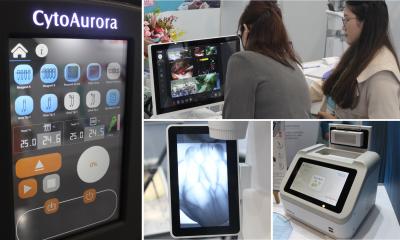© Constanze Tillmann/ Messe Düsseldorf
News • MEDICA Labmed Forum
Hot issues, current trends and innovations in lab medicine
Cancer and coronary diseases, infections and new anti-bacterial active substances, digitalisation and artificial intelligence – these are some of the top issues discussed this year at the MEDICA Labmed Forum.
Laboratory medicine forms a bridge between clinical practice, research and patient care. Together with the life sciences, it is therefore an essential driver for a progressive healthcare system. Over the last years, the forum has developed into an especially noted part of the programme at the internationally leading trade fair for the health and medical technology industry, and will be held on all four days of the event in the trade fair Hall 1 from 10.30 a.m. to 4.00 p.m.
Though the topics are complex, it is a hallmark of the MEDICA Labmed Forum that all presentations are short, to the point and easy to understand, and can be addressed in further depth in panel discussions.
Like last year, the sophisticated programme was organised by Prof. Stefan Holdenrieder and Prof. Georg Hoffmann (German Heart Centre at the Technical University of Munich). During each lunch break, exhibiting companies are given the opportunity to introduce themselves with short presentations about their company.
Monday: IVDR and AI in Laboratory Management
On Monday, MEDICA starts with two “scandalous” issues which currently cause heated debates throughout the field of laboratory medicine: the potential threat to the existence of small IVD companies and specialised labs posed by the “In-Vitro Diagnostics Regulation” (IVDR) and the use of artificial intelligence (AI) with new possibilities and also risks.
Led by Prof. Astrid Petersmann (University of Oldenburg), in the morning there will be a professional discussion concerning the challenges posed by the new EU directive for the quality assurance of diagnostic tests, and how these can be overcome.
Recommended article

Article • Regulatory challenges for AI-based diagnostics
Further IVDR changes: a step in the right direction, but…
New changes made to the timetable for the In vitro Diagnostic Medical Device Regulation (IVDR) across Europe could have a significant impact on manufacturers and users, an expert points out. While the extension of the transition period was a welcome step, other changes which were hoped for remain painfully absent.
In the afternoon, an equally exciting discussion will follow, concerning how artificial intelligence and machine learning are about to change the way we work in laboratories. One of the most advanced application areas currently is the automatic evaluation of microscopic images and complex data sets, for example in the diagnosis of leukaemia.
Tuesday: Advances in Lab Diagnostics in Oncology and Cardiology
On the second day, led by Prof. Stefan Holdenrieder, German Heart Centre Munich, there will be a discussion of new developments in laboratory medicine within the fields of oncology and cardiology. Over the last years, research has revealed the enormous potential of blood examinations for the diagnosis, prognostication and therapy management of different types of cancer. For example, circulating tumour cells and nucleic acids are becoming established as a second methodological pillar, which opens up new perspectives beyond the classic examination of tissue for the field of oncology.
A change of perspective is visible in cardiology as well: Molecular diagnostic tests allow for the increasing improvement of risk assessment for arteriosclerotic cardiovascular diseases, and thanks to advances in heart surgery, the importance of genetic examinations in the case of congenital heart defects is also on the rise. Other than that, thromboinflammation presents a new pathophysiological concept for understanding thrombogenesis.
Recommended article

Interview • Troponin
Biomarkers are diagnostic game changers
Providing insights into new cardiac testing methods, Professor Stefan Holdenrieder, Director of the Institute of Laboratory Medicine at Munich’s German Heart Centre, explained why biomarkers are a game changer in diagnostics.
Wednesday: The Young Scientists‘ Perspectives
The third day of the Forum traditionally belongs to the next scientific generation within laboratory medicine. PD Dr Verena Haselmann, senior physician at the University Hospital Mannheim, invites young colleagues every year to report on their current research and thus give an outlook on the future of the scientific field.
The leitmotif for 2023 is taken from the “data sciences”, which naturally exert a special attraction for young people due to the intelligent evaluation of large amounts of lab data. The presentation subjects in the morning run the gamut from AI-supported image evaluation to the analysis of complex lab data to the automated generation of reports on diagnostic findings. In the afternoon, there will be a discussion of practical applications in hospitals, in doctor’s offices and within the diagnostics industry, among other subjects.
Thursday: Innovation from an Industry Perspective
The last day of the event at the MEDICA Labmed Forum starts with an overview of diagnostic solutions that noticeably shorten the time it takes to identify a pathogen, thus allowing physicians to make the most effective therapeutic response at an early stage instead of turning in risky diagnostic circles and losing time. Special attention is given to managing septicaemia through quick identification of the pathogen and the targeted use of antibiotics.
Bacterial resistances to antibiotics are a serious and growing health problem that is accepted as the new normal in some health systems, among them Germany, and which will therefore cost the lives of thousands of people in future
Peter Quick
More thorough research into scientific basics and possible applications yields a perspective for future options beyond classic antibiotic therapy, with the goal of countering the problematic development of resistances through innovative approaches. The spectrum of possible approaches under discussion ranges from the use of small molecules against bacterial toxins or specific transporters in the bacterial wall to phage therapy.
A look inside the world of “Next Generation Sequencing” (NGS) and bioinformatics rounds out the event. The focus here is on characterising the microbiome of newborns, a very vulnerable patient group. Another established tradition at MEDICA is the presentation of future trends from the point of view of the diagnostics and life science industry – a part of the forum programme that has for years been realised by Dr Peter Quick, member of the board of the Diagnostics Industry Association (Verband der Diagnostica-Industrie, VDGH). Present for the first time as a co-chairman this year is his colleague in the association, Dr Jan Gorka. Both have chosen infectious diseases as a focus for 2023, because ‘bacterial resistances to antibiotics are a serious and growing health problem that is accepted as the new normal in some health systems, among them Germany, and which will therefore cost the lives of thousands of people in future,’ according to Quick.
Source: Messe Düsseldorf
13.09.2023





